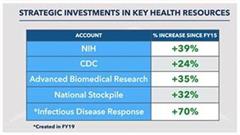Congressman Griffith's Weekly E-Newsletter 3.13.20Coronavirus
Friday,
March 13, 2020
|
Kevin Baird
(202-225-3861)
Tags:
Health Care
The topic of this column will be the coronavirus. This topic has previously been discussed here before, and because of the rapidly changing situation, the information I present may not be completely up to date when you read it. Nevertheless, these are important facts to know about this significant public health challenge. The coronavirus originated in Wuhan, China, and has since been classified by the World Health Organization as a pandemic, an illness with global reach. Cases have been confirmed in most of the 50 states and the District of Columbia. Virginia has 30 cases of the coronavirus as of 12:00 pm, March 13. None have been confirmed in Southwest Virginia. I have been briefed regularly by the public health officials and medical professionals leading the U.S. response to the outbreak, including Director of the National Institute of Allergy and Infectious Diseases Dr. Anthony Fauci and Director of the Centers for Disease Control and Prevention (CDC) Dr. Robert Redfield. Their agencies, the National Institutes of Health (NIH) and the CDC, received spending increases of 39 percent and 24 percent respectively between fiscal years 2015 and 2019.* The Federal Government has acted in an attempt to contain and, further, to treat the coronavirus and mitigate its economic and societal effects. On March 6, President Trump signed legislation approved by Congress and which I voted for, providing $7.8 billion in emergency spending to respond to the coronavirus. Among the provisions of this spending bill are:
On March 11, the U.S. Department of Health and Human Services awarded over $560 million of the funds going to state and local response efforts. Virginia will receive $13.4 million. President Trump has instituted travel restrictions on certain foreign countries to prevent more possibly infected travelers from entering the United States. Meanwhile, his administration is helping to ease the disruption occurring in our daily lives as a consequence of the coronavirus. The U.S. Department of Agriculture (USDA) has granted Virginia flexibility to school meal service. For students who depend on school meals, USDA’s waiver will ensure they can continue to rely on them. It is important to note that while USDA will continue to support these meals, local school systems are in charge of the logistics of feeding the students. The U.S. Department of Labor has also outlined the flexibilities states have in administering unemployment insurance, which can help individuals whose work lives are disrupted by the coronavirus. The U.S. Department of Veterans Affairs (VA) announced safeguards for its nursing home population, adopting a no visitor stance, suspending new admissions, and screening nursing home staff daily. As older individuals who frequently have other health conditions, residents of VA nursing homes, such as the Salem VAMC, are an at-risk population. The VA’s actions will help reduce that risk. During a time of widespread contagion, the practice of “social distancing” becomes one of the most valuable tools to mitigate infection. Many entities are cancelling or limiting large events. Symptoms of the coronavirus include fever, cough, and shortness of breath. If you think you or someone close to you may have contracted it, contact your doctor. He or she will determine whether you need to be tested. The Virginia Department of Health processes tests, but it has strict criteria for doing so. Private labs are expanding their testing capacity. LabCorp and Quest, which have locations in Southwest Virginia, are capable of testing, and other entities are likely to have the capacity in the near future. Your doctor or other health care professionals, however, remain your first point of contact. It is important to have a clear and realistic view of coronavirus’ dangers and its impacts on our lives. Such an understanding will help protect you and your family and bring closer our return to normalcy. If you have questions, concerns, or comments, feel free to contact my office. You can call my Abingdon office at 276-525-1405, my Christiansburg office at 540-381-5671, or my Washington office at 202-225-3861. To reach my office via email, please visit my website at www.morgangriffith.house.gov. Also, on my website is the latest material from my office, including information on votes recently taken on the floor of the House of Representatives. * Other relevant spending increases included in the chart below. “National stockpile” refers to medical supplies and devices.
### |
Stay Connected
Use the form below to sign up for my newsletter and get the latest news and updates directly to your inbox.


